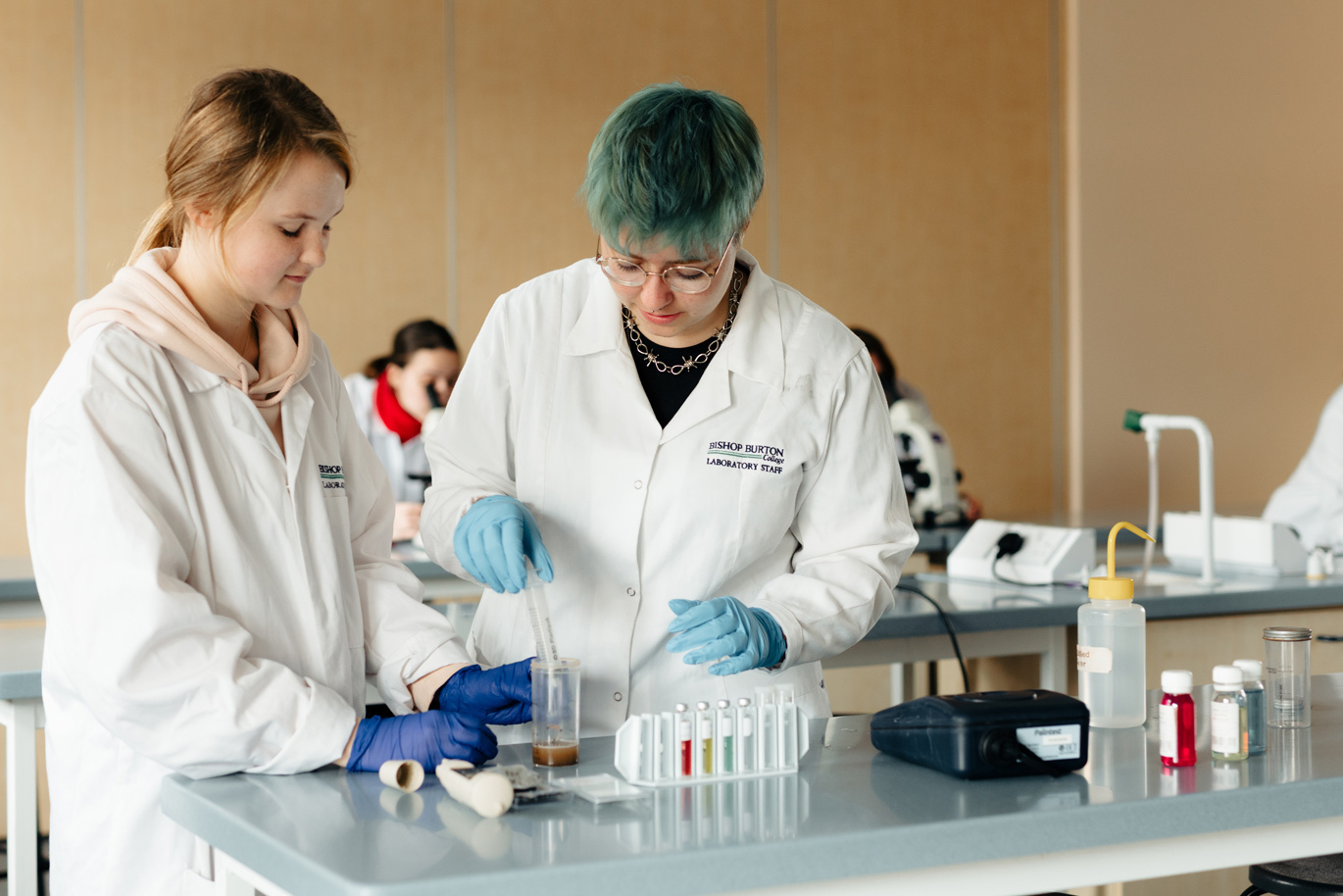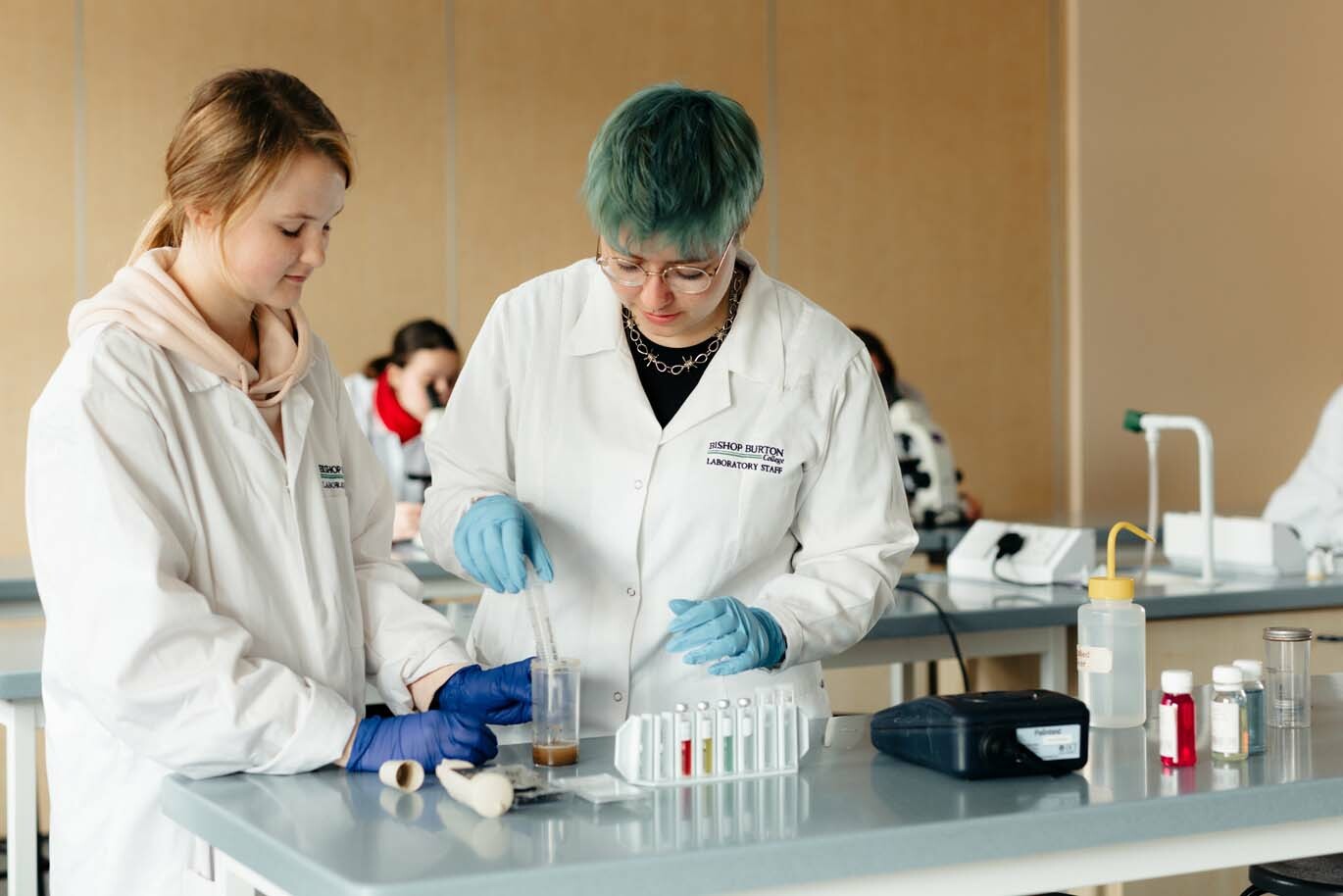
Jump to
Subject
Animal Sciences
Level
Bachelors Degree (Level 6)
Study Mode
Full-Time
Duration
3 years full-time
Start Date
September 2025
UCAS Course Code
D422
The course
Our Bioveterinary Science degree programme will help you to develop sound academic and practical knowledge of the disciplines and factors related to animal science in relation to a range of species and areas of the animal industry.
This programme will prepare you for an exciting career within veterinary and/or animal science.
There is an increasing demand for people with a combination of both academic and practical competence within the animal industry, which is why this course allows you to learn in a vocational and applied nature. You will complete both lessons and assessments on our animal unit and farm, working with a variety of species, as well as developing your practical science and industry skills within our state-of-the-art labs.
Course Information
- The Bioveterinary Science programme is designed to prepare you for working within the veterinary or animal science industry. It will allow you to learn in-depth biology and physiology of animals, and includes the science behind animal health, disease and welfare.
- The course focuses on ensuring you have the necessary laboratory skills to work in a range of areas. This is achieved through a variety of lab-based modules, ensuring that when you graduate you will have proficient laboratory skills.
- There is a focus towards production animals within the programmes as this is a key area of employment.
- The Final Project module allows you to complete an independent piece of work specialising in an area of research that you are interested in that reflects the interdisciplinary nature of the degree programme. As part of this module, you will undertake a poster presentation which will be completed at a showcase event that will allow the students to network with relevant employers.
Year 1
- Academic Professional Skills
- Comparative Anatomy and Physiology
- Animal Biology and Introduction to Laboratory Science
- Animal Health and Nutrition
- Principles of Animal Behaviour Science
- Development of Professional Skills
Year 2
- Behaviour and Management of Production Species
- Data Skills for Animal Scientists
- Ethics, Welfare and Legislation
- Livestock Reproductive Technology
- Cellular Processes and Biochemistry
- Entrepreneurialism
Year 3
- Genetics and Biotechnologies
- Disease Process, Immunology and Healing
- Laboratory and Veterinary Diagnostic Techniques
- Advanced Livestock Science
- Final Project
You will need:
A minimum of 96 UCAS points OR a relevant BTEC Level 3 and significant industrial experience
Plus:
GCSE English 4 or above or equivalent and a suitable reference
UCAS points may be from qualifications such as T Levels, A Levels, BTEC Level 3 Extended Diplomas, Access to Higher Education Diplomas, and City and Guilds Advanced Technical Diplomas amongst others. Please use the UCAS Tariff points calculator to determine the UCAS points value of your qualifications.
Life and/or experience of non-traditional students will be taken into account when considering applications. The successful completion of an entry task may be required when considering applications without the required formal entry qualifications.
If an applicants first language is not English, or a Tier 4 student visa to study is required and GCSE English at grade 4/C or equivalent is not held, they will need to evidence their English language proficiency level, such as International English Language Testing System (IELTS) 6.0 overall (with a minimum 5.5 in each skill).
Advanced entry may be possible due to prior experience or certificated learning; applicants will be invited to complete the recognition of prior learning approval process.
This programme is delivered with a variety of learning and teaching approaches to include all students learning styles and preferences.
For all modules, theory lectures are delivered that aim to deliver the core content and provide the underpinning knowledge.
To complement the theory lectures, students have group seminars/practical sessions that are used to reinforce concepts delivered theoretically.
The teaching methods focus on facilitating a student-centred approach to enhance the independent learning that takes place outside of the classroom.
You will study at our Bishop Burton campus in East Yorkshire, UK.
The full-time route incorporates approximately 9-14 hours of contact time per week, encompassing lectures, seminars, practicals and tutorials. Additional to this time will be final project support sessions in your final year that you can book with your supervisor.
You are also expected to carry out a significant amount of independent study in addition to contact time (approximately 25-30 hours a week). Independent study includes reading around the subject, preparing for tutorials and seminars, preparing for, and completing, module assessments; forming an essential part of your learning journey.
You can expect to receive your timetable during induction week.
- A tablet, laptop or stationery to take notes in lectures and seminars.
- College-branded white laboratory coat.
- College-branded blue kennel coat.
- All college-branded equipment will need to be purchased from our online shop.
- Appropriate waterproof outdoor clothing and footwear for outdoor practical sessions.
- Strong steel toe capped boots for practical sessions.
- The college has a strict policy of not allowing work boots inside college buildings you will need to have alternative footwear (shoes or trainers) to attend lectures and tutorials.
- Roughly £300 to cover the costs of field trips and visits over the duration of your programme.
- A wide range of resources are available for use both on and offsite for dissertation projects but it may not be possible to purchase/service all requests, therefore students need to be aware that they may need to self-fund some elements.
- On successful completion of the programme, you will have the opportunity to graduate at a ceremony wearing formal dress. The hire of the formal dress is an additional cost.
Validated by University of Hull
We are proud to collaborate with University of Hull on the validation of this course.
This includes transforming our programmes to ensure that we meet the evolving needs of the sector, giving you the best opportunities for success when you graduate by having a competence-based focus. Find out more about competence-based higher education.
View the policies and procedures you would be agreeing to comply with by registering for this programme. This encompasses University of Hull Quality and Standards, including a Guide for Collaborative Provision students.
Financial Information
Find the full details of the fees associated with this programme and the financial support available.


